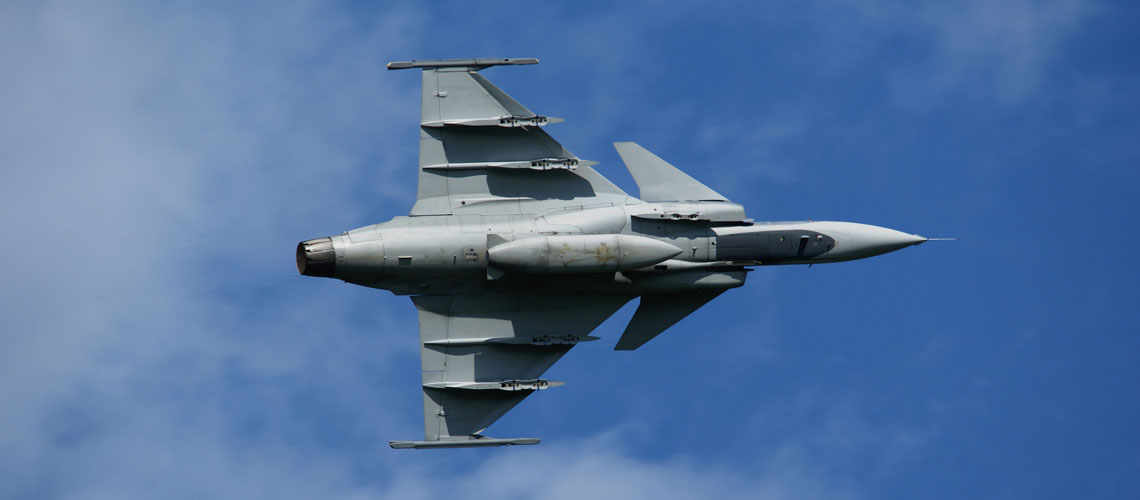
Published
- Financing
- Guarantees
- Trends
In defence of defence
The war in Ukraine has triggered a reassessment of defence spending in financial and political circles. How can export finance contribute?
Practically overnight, Russia’s invasion of Ukraine prompted a worldwide reassessment of defence investment and heralded a new approach to NATO in Northern Europe, as Sweden and Finland applied for membership in the military alliance.
Even if Sweden has enjoyed over 200 years of peace, the country sports a sizeable defence industry with manufacturers like Saab, Hägglunds and Bofors developing and exporting fighter jets, combat vehicles and arms. “Our long history of non-alignment has required us to secure domestic sourcing of defence equipment,” says Kristian Orrbeck, Head of Defence Industry at EKN.
Given the small size of the domestic market, however, Sweden’s defence contractors have always relied on exports to reach economies of scale in research and manufacturing. The sale of Saab’s Gripen jets to Brazil in 2014 was Sweden’s largest ever export deal.
All defence exports are reviewed by the Swedish government agency ISP, The Inspectorate for Strategic Products, to control and ensure compliance with legislations concerning military equipment. ISP also implements sanctions imposed by UN, EU and other international bodies.
“Buyers prefer stability”
Since much of the defence spending is financed through government budgets, export credits are not as common as in some other sectors, at least not for exports to high-income countries. Nevertheless, the involvement of a government agency such as EKN is always welcomed, notes Orrbeck: “Many buyers prefer the stability and long-term commitment that a government agency brings to the table.”
Christian Luiga, CFO at Saab, says the demand for defence equipment started to grow already in 2015. “The tragic war in Ukraine accelerated the need to protect people and societies. In Europe alone, defence procurements are expected to double between 2020 and 2027.”
Luiga has witnessed a more positive attitude towards defence investment in the financial community. “Getting access to financing on the same terms as other industries is beneficial, not least in turbulent times when credits become tighter for other reasons.”
Still, it takes time for investors and creditors to redefine their views on whether defence equipment is a sustainable investment. “Sustainability is a wide concept, but in the context of UN’s Sustainable Development Goal 16, which highlights peace and justice in society, the defence industry certainly has a part to play. To Saab, sustainability in everything and contributing to a safe and secure world is a cornerstone of our business strategy,” he says and adds, “Still, each bank and investor must arrive at their own conclusion.”
“A new era”
After years spent treating weapons manufacturers with caution, it would seem as if bankers in Europe are positioning themselves for closer relations with the defence industry. Germany has abandoned its decades-old aversion to military spending, and instead embrace what Chancellor Olaf Scholz has called a “new era” of investment. For banks and asset managers, the development means a group of clients that until recently had been kept at arm’s length is now being invited to seek financing.
“It is clear that there will now be more investments in the defence industry here in Germany, and they’re all our clients,” Manfred Knof, the chief executive of Commerzbank, told analysts and investors earlier. And there are signs the EU is on the same track. In a policy paper, the bloc spoke of the need to ensure that “initiatives on sustainable finance remain consistent with European Union efforts to facilitate the European defence industry’s sufficient access to finance and investment.”
As Nobel Peace laureate Oleksandra Matviichuk said at the Davos summit: “My job is to fight for human rights. I am a lawyer. But when the law is no longer sufficient to prevent Russians from killing us, we must defend our freedom with other means. Today, weapons are the best way to protect human rights in Ukraine.”
Financiers return
Financiers who previously stayed clear of funding military equipment are returning to the stage. SEB, one of Sweden’s biggest banks, said in January it’s reversing a ban on investing in weapons as it adjusts its sustainability policy to match Europe’s new geopolitical reality. The change in policy was based on a view that “investments in the defence industry are of key importance to uphold and defend democracy, freedom, stability and human rights.”
As for the cooperation with EKN, export credit financing is an important component in creating an attractive proposition, according to Luiga. “Defence transactions are often quite large and span several years, which carries a financial exposure that needs to be managed. Even if we rarely need to invoke a guarantee, it brings a sense of security across the board. And even if export financing may not be a dealbreaker to the buyer, it can still be an attractive way to diversify financing.”
Luiga appreciates what he calls the professionalism of EKN: “Our deals may take years to complete and much can happen on the way. Trust, stability and a long-term perspective are instrumental to our collaboration with EKN.”
